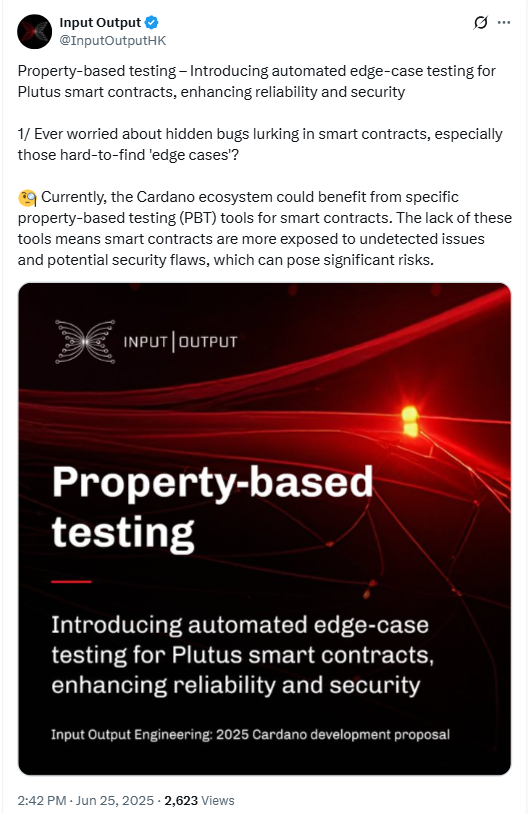A recent social media post by Input Output shows that Cardano is taking a bold step to improve the safety and dependability of its smart contracts.
The blockchain has introduced a new property-based testing tool designed to help developers find hidden flaws.
This will focus on more edge-case bugs before they cause problems with the blockchain.
Plutus Smart Contract Testing Gets a Powerful Upgrade
As detailed in a recent social media post, Plutus smart contracts on the Cardano blockchain are about to get more secure.
This was made available by the introduction of a new tool called Plinth.
With this innovation, developers can now perform what is known as property-based testing.
This method automatically generates various inputs to test how smart contracts behave under different conditions.
The goal here is simple. They want to be able to spot problems before they reach the blockchain.

In the past, developers relied heavily on manual testing or limited tools that could miss small but damaging flaws.
These minor flaws, often called edge cases, can go unnoticed but later cause major problems.
With property-based testing, the tool pushes contracts to their limits, checking whether they behave correctly across different scenarios and helps catch hidden issues early in development.
It is important to add that what sets Plinth apart is how well it fits into the existing development process.
It works directly with the Plutus workflow, allowing developers to test their contracts without switching tools or rewriting code.
Consequently, it automatically covers a wide range of test cases. This saves time while improving the overall quality and reliability of the contracts.
This notable development happened during the same season as the Leios upgrade, which became a central topic within the Cardano community.
Plinth Brings Stronger Security to Cardano Ecosystem
It is worth noting that security has always been a key concern in the world of blockchain.
Cardano developers recently introduced anti-grinding measures to prevent block creation manipulation and boost transaction speed.
For Cardano, strengthening smart contract testing means reducing the risk of financial loss and protecting users from potential exploits.
The introduction of Plinth is a big step towards building a more resilient ecosystem.
With Plinth, developers can now check that their contracts follow expected rules and do not behave unexpectedly in rare situations.
It is not only about spotting bugs. It also validates assumptions and avoids costly mistakes before contracts are deployed.
This level of testing increases trust in smart contracts and boosts confidence among users and developers alike.
Importantly, the tool addresses a major gap in Cardano’s infrastructure.
Until now, there was no dedicated tool focused on property-based testing for Plutus contracts.
Plinth fills that space, offering the much-needed support for a more secure and dependable system.
Improving Developer Experience While Protecting Users
Furthermore, Plinth is not only a win for security. It also improves the development experience.
It reduces the time needed for testing and helps catch issues earlier, allowing developers to focus on writing better code.
This will lead to stronger projects and fewer surprises down the line.
The added benefit is that contracts tested with Plinth are more likely to perform reliably under real-world conditions.
Users interacting with these contracts can do so more confidently, knowing that the systems have been tested thoroughly.
As Cardano grows, tools like Plinth will be essential in maintaining quality.
By focusing on Plutus smart contract security through property-based testing, Cardano has set a higher standard for smart contract development.
 thecoinrepublic.com
thecoinrepublic.com